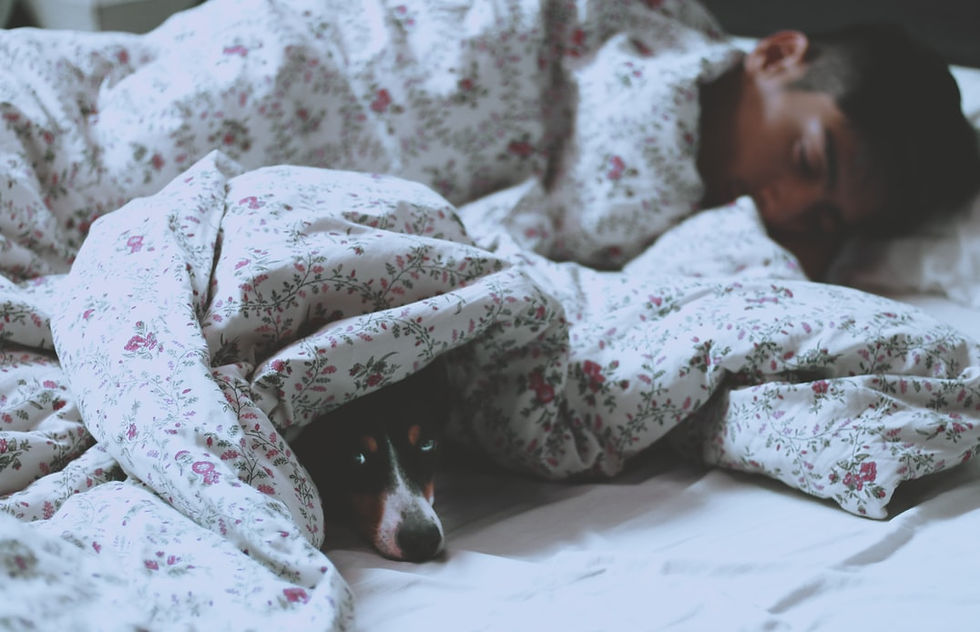The Side Effects of Sleep Deprivation
- Chloe
- Feb 26, 2021
- 3 min read

- Image from Unsplash.com
We all know at least one person who never seems to get enough sleep – whether it’s an issue like insomnia or they just have a terrible sleep schedule. But what are the true side effects of sleep deprivation? How long can someone go without getting any sleep at all? And, in severe cases of sleep deprivation, what happens?
The longest recorded time that someone has went without sleep is approximately 11 days: around 264 hours to be precise. The longer you go without sleep, the more severe the side effects will get and the more your body will be affected. Even though it’s rare to die of sleep deprivation alone, it is possible, and it can cause heightened risk of accidents leading to injury.
Most people have experienced at least one all-nighter in their life, where they haven’t slept to complete an assignment, or binge-watch a new series. Even then, there are side effects to sleep deprivation, but all are rather minor. These include irritability, drowsiness, memory issues, decreased hand-eye coordination and muscle tension. But combining these side effects with daily tasks such as driving and it shows how even after just missing one night’s sleep, risks go up. For example, since there is a lack of concentration, being on the road leads to issues where you may not have the reaction time you usually do to avoid dangers. But even then, one day missing sleep is not going to have a severe impact on your health alone unless it’s a regular occurrence.
The longer you go without sleep though, the higher risks get. After only three- or four-nights missing sleep, the more severe side effects kick in. You can begin to hallucinate, and bodily functions are altered as sleep helps to regulate hormones in your body, such as insulin and human growth hormone. After only 36 hours, your appetite, metabolism, mood and stress level are affected, leading to extreme fatigue and hormone imbalances. With this fatigue, it leads to the brain not functioning at the levels it usually would be, decreasing attention span and leading to more irrational decision making, inflexible reasoning and even speech impairments.
When you reach the two-day mark, your body begins trying to force itself to sleep by making you go into ‘microsleeps’; periods of where your brain goes into a sleep like state for up to 30 seconds, leaving you confused and disorientated. This is where health risks come into play with sleep deprivation since your immune system begins to be disrupted with cell activity decreasing and inflammatory markers in the body rising and circulating at increased rates, leading it to be easier for your body to be attacked by viruses or bacteria.
After three days, it is difficult to stay awake without assistance as your body is begging you to sleep. Your attention span will decrease significantly, remembering details will become more difficult and your ability to think will be affected, meaning simple tasks may become difficult to complete. Not only are your own emotions affected too, with increased irritability, depressed moods, anxiety and paranoia being common, but also the ability to recognise others emotions become more difficult. As time goes on, the longer you go without sleep, the more likely it is you will find your perception altered. People have reported experiencing hallucinations and illusions, misinterpreting things that are real, showing how it is a real risk to your physical and mental health to go for several days without sleep.
Your body may also have cravings of food which will give you bursts of energy, increasing your appetite. With an increased desire for these types of foods, it leads to consuming empty calories, therefore having a chance of leading towards weight gain. As well as this, dehydration can make the side effects of sleep deprivation more severe.
Many people experience partial sleep deprivation, where you may only receive a few hours of sleep a night. This leads to effects such as anxiety, unstable moods, drowsiness, forgetfulness, difficulty concentrating and staying alert, which leads to decreased performance at work or school. If someone is experiencing sleep deprivation, it is important to try and tackle it as soon as possible and try and work out the cause and possible solutions.
So, whilst it may not be too serious skipping a night’s sleep on the odd occasion for work purposes or to binge a show, in the long term, it is more of a serious issue. Going consecutive days without sleep leads to difficulty with functioning with regular day to day activities and heightened risks. Don’t be tempted to test to see how long you can go without sleep, and, if you do, be aware of the risks. If you are struggling with sleep deprivation, try and find ways to tackle it and, in some cases, contact your doctor for advice.
By Chloe Hall





Comments